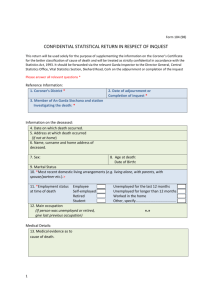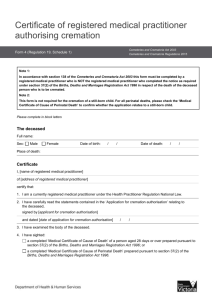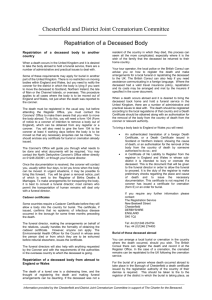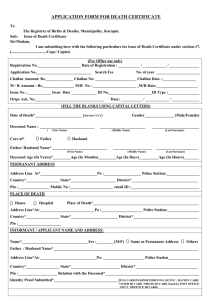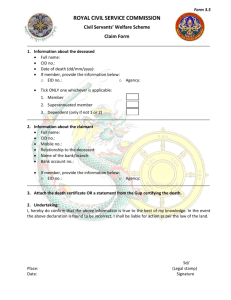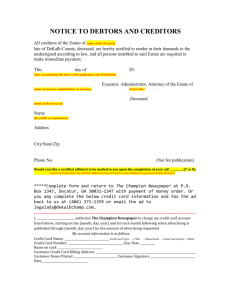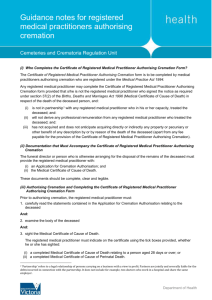Open
advertisement
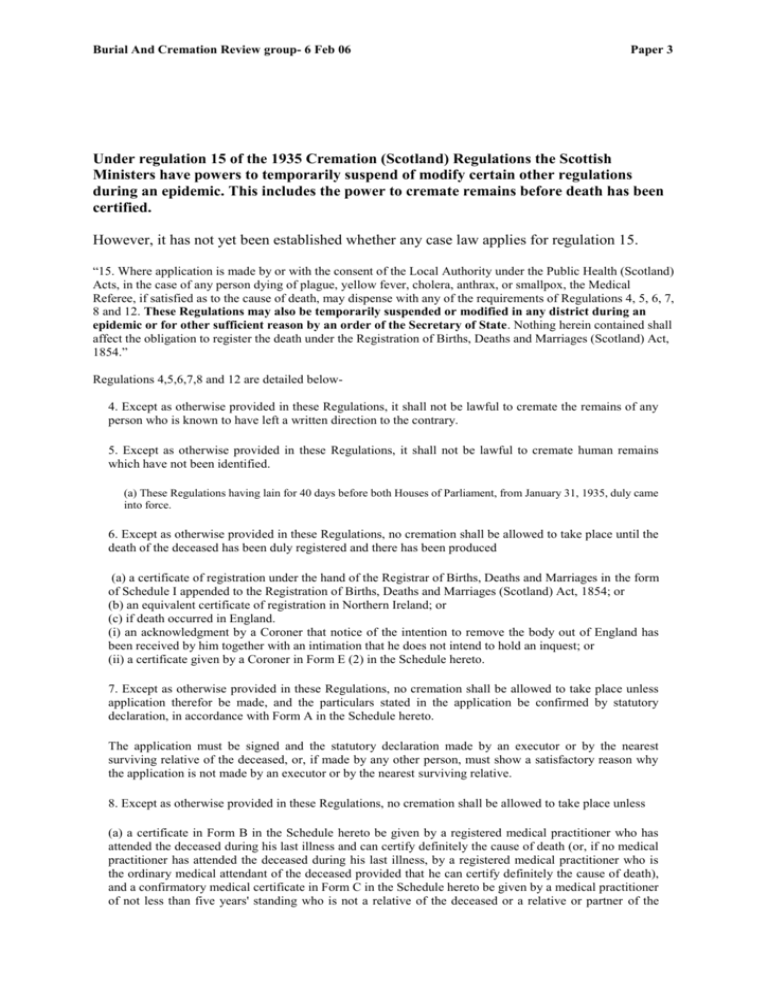
Burial And Cremation Review group- 6 Feb 06 Paper 3 Under regulation 15 of the 1935 Cremation (Scotland) Regulations the Scottish Ministers have powers to temporarily suspend of modify certain other regulations during an epidemic. This includes the power to cremate remains before death has been certified. However, it has not yet been established whether any case law applies for regulation 15. “15. Where application is made by or with the consent of the Local Authority under the Public Health (Scotland) Acts, in the case of any person dying of plague, yellow fever, cholera, anthrax, or smallpox, the Medical Referee, if satisfied as to the cause of death, may dispense with any of the requirements of Regulations 4, 5, 6, 7, 8 and 12. These Regulations may also be temporarily suspended or modified in any district during an epidemic or for other sufficient reason by an order of the Secretary of State. Nothing herein contained shall affect the obligation to register the death under the Registration of Births, Deaths and Marriages (Scotland) Act, 1854.” Regulations 4,5,6,7,8 and 12 are detailed below4. Except as otherwise provided in these Regulations, it shall not be lawful to cremate the remains of any person who is known to have left a written direction to the contrary. 5. Except as otherwise provided in these Regulations, it shall not be lawful to cremate human remains which have not been identified. (a) These Regulations having lain for 40 days before both Houses of Parliament, from January 31, 1935, duly came into force. 6. Except as otherwise provided in these Regulations, no cremation shall be allowed to take place until the death of the deceased has been duly registered and there has been produced (a) a certificate of registration under the hand of the Registrar of Births, Deaths and Marriages in the form of Schedule I appended to the Registration of Births, Deaths and Marriages (Scotland) Act, 1854; or (b) an equivalent certificate of registration in Northern Ireland; or (c) if death occurred in England. (i) an acknowledgment by a Coroner that notice of the intention to remove the body out of England has been received by him together with an intimation that he does not intend to hold an inquest; or (ii) a certificate given by a Coroner in Form E (2) in the Schedule hereto. 7. Except as otherwise provided in these Regulations, no cremation shall be allowed to take place unless application therefor be made, and the particulars stated in the application be confirmed by statutory declaration, in accordance with Form A in the Schedule hereto. The application must be signed and the statutory declaration made by an executor or by the nearest surviving relative of the deceased, or, if made by any other person, must show a satisfactory reason why the application is not made by an executor or by the nearest surviving relative. 8. Except as otherwise provided in these Regulations, no cremation shall be allowed to take place unless (a) a certificate in Form B in the Schedule hereto be given by a registered medical practitioner who has attended the deceased during his last illness and can certify definitely the cause of death (or, if no medical practitioner has attended the deceased during his last illness, by a registered medical practitioner who is the ordinary medical attendant of the deceased provided that he can certify definitely the cause of death), and a confirmatory medical certificate in Form C in the Schedule hereto be given by a medical practitioner of not less than five years' standing who is not a relative of the deceased or a relative or partner of the Burial And Cremation Review group- 6 Feb 06 Paper 3 practitioner who has given the certificate in Form B or by the Medical Referee acting under Regulation 11 hereof; or (b) a post-mortem examination has been made by a medical practitioner expert in pathology appointed by the Cremation Authority (or in case of emergency appointed by the Medical Referee) and a certificate given by him in Form D in the Schedule hereto; or a certificate in Form D has been given by the Medical Referee acting under Regulation 11 hereof; or (c) permission in writing in Form E (1) in the Schedule hereto has been given by the Procurator Fiscal of the district in which death occurred; or (d) a post-mortem examination has been made and the cause of death has been certified by a Coroner under Section 21 (2) of the Coroners (Amendment) Act, 1926, and a certificate has been given by the coroner in Form E (2) in the Schedule hereto; or (e) an inquest has been held and a certificate has been given by the Coroner in Form E (2) in the Schedule hereto; provided that in any case in which the death occurs in connection with an industrial, railway, flying, or road accident and the Coroner adjourns the inquest with a view to the investigation of the causes of the accident, he may give a certificate in Form E (2) with the necessary modifications if he is satisfied that death was due to an accident, without waiting for the termination of the inquest. 12. Except as otherwise provided in these Regulations the Medical Referee shall not authorise any cremation to take place (a) if it appears that the deceased left a written direction to the contrary; (b) if the remains have not been identified; (c) unless he is satisfied that the application is made by an executor or by the nearest surviving relative of the deceased, or, if made by any other person, that the fact that an executor or the nearest relative has not made the application is sufficiently explained, and that the person making the application is a proper person to do so; (d) until he has examined the application referred to in Regulation 7 and the certificates referred to in Regulations 6 and 8 (including the acknowledgment and intimation by a Coroner referred to in Regulation 6 (c) (i), (if any) and ascertained that they are such as are required by these Regulations and that the inquiry made by any persons granting certificates has been adequate, and is satisfied that the fact and cause of death have been definitely ascertained, and that there exists no reason for any further inquiry or examination. The Medical Referee may make any inquiry with regard to the application and certificates that he thinks necessary, may refuse to grant authority until he has himself examined the body and may in any case decline to authorise the cremation without stating any reason. In the event of any suspicious circumstances whatsoever coming to his knowledge, whether revealed in the application or certificates, or otherwise, and in particular if the cause of death assigned in the medical certificates be such as, regard being had to all the circumstances, might be due to poison, to violence, to any illegal operation or to privation or neglect, or if there is any reason to suspect that death occurred while the deceased was under an anaesthetic, the Medical Referee shall forthwith report the matter to the Procurator Fiscal of the district in which death occurred, and shall decline to authorise the cremation except with written permission of such Procurator Fiscal in Form E (1) in the Schedule hereto.


